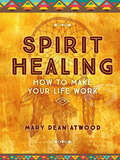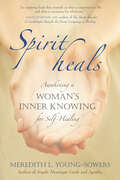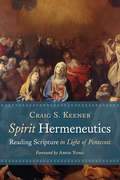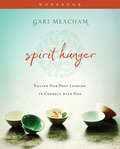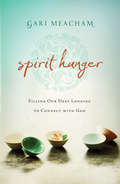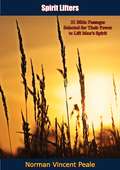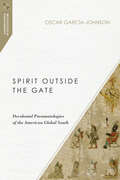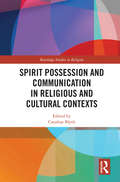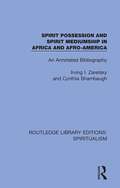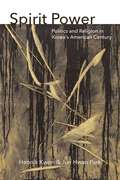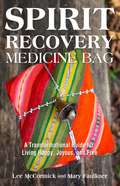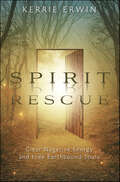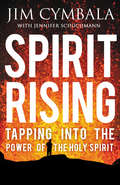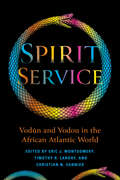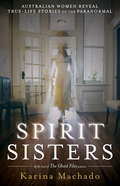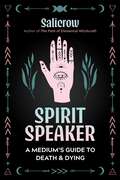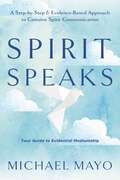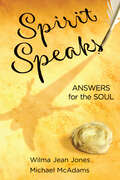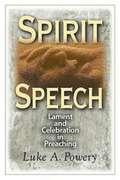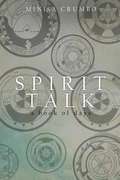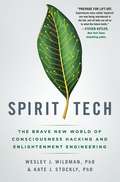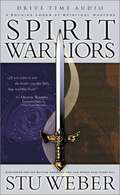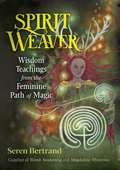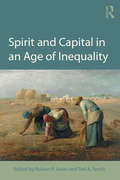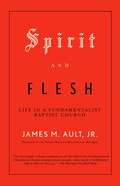- Table View
- List View
Spirit Healing: How To Make Your Life Work
by Mary Dean AtwoodFollow the Rainbow Path, with this the classic reference to Native American healing—now with an attractive new cover and design. For centuries, tribal shamans have used these remarkable healing practices to bring spiritual seekers into harmony with the world around them. In keeping with that Native tradition, mystic Mary Dean Atwood uses symbolic stories to illustrate the power of shamanic techniques, and offers detailed guidance to help you change your thought patterns, eliminate mind-cluttering worries, and develop contact with your spirit guide. Master the secrets of rock divination, animal-spirit communication, and message reading—and embark upon a life-altering vision quest to find your higher self.
Spirit Heals: Awakening a Womans Inner Knowing for Self-Healing
by Meredith Young-SowersMeredith L. Young-Sowers has created a definitive book for women on mind/body/spirit healing that puts women’s connection to Spirit at the very center — exactly where it should be. Drawing on her twenty-seven years as an intuitive healer and spiritual teacher, and her belief that healing is something we do every day, Meredith gently guides women to create our own loving and workable healing plan. Emphasizing heart disease and reproductive cancers — the diseases that are claiming our mothers, sisters, and friends — Meredith offers a mix of attitude shifts, exercises, and simple meditations to help us harness the power of Spirit. Meredith teaches us to understand and rely on our deep-hearted intuition as our most important healing partner. In this wide-ranging exploration of healing, you’ll learn to: nourish yourself on all levels — emotional, intellectual, social, physical, and spiritual; respond effectively to stress in a way that heals your heart; understand why mind-body imbalances can sometimes manifest as disease; claim strength and renewal at each stage of your journey.
Spirit Hermeneutics: Reading Scripture in Light of Pentecost
by Craig S. KeenerBiblical-theological reflection supporting a dynamic, experiential, Spirit-guided reading of Scripture How do we hear the Spirit's voice in Scripture? Once we have done responsible exegesis, how may we expect the Spirit to apply the text to our lives and communities? In Spirit Hermeneutics biblical scholar Craig Keener addresses these questions, carefully articulating how the experience of the Spirit that empowered the church on the day of Pentecost can — and should — dynamically shape our reading of Scripture today.
Spirit Hunger Workbook: Filling Our Deep Longing to Connect with God
by Gari MeachamSpirit Hunger unwraps our heart’s desire to engage God, even when we cover that desire with lesser loves. In this six-session study, author and speaker Gari Meacham identifies the path we share as we struggle to engage God in prayer and belief. Meacham writes, “With the authenticity of my own life stories--marriage to a professional baseball player, struggles with severe food bondage, and a father who was a quadriplegic—I came to the crisp realization that my prayer life and the belief needed to match. Spirit Hunger provides a clear path towards matching these heart cries—leading away from crumbs and counterfeit, to a hungering for God.” Designed for use with the video.
Spirit Hunger: Filling Our Deep Longing to Connect with God
by Gari MeachamWe all have a desperate need for God – not just for following him or being committed to him, but to be intimately connected to him. We long for purpose, for affirmation, for attention, for nurture. But Gari Meacham writes that we fall short of being desperate for God, or we miss the longed-for romance with God we hear about in scripture. We’re uncertain how to distinguish our longings from our fears. When, says Meacham, did our longings turn to hauntings? And when did we buy into the counterfeit yearnings for control, and the insecurity, perfectionism and other attitudes that quench Spirit Hunger? The answer to Spirit Hunger is to engage God like never before. In this book Meacham shows through her story and the stories of others how to turn worry into belief, problems and heartaches into a life of intimate prayer, and sighs for intimacy into closeness with God. She discusses her discoveries about prayer including why asking is sometimes hard, how we can notice and track God’s movements as we seek his answers, and why it’s sometimes such a struggle to believe after we’ve prayed. Meacham writes, “With the authenticity of my own life stories—marriage to a professional baseball player, struggles with severe food bondage, and a father who was a quadriplegic—I came to the crisp realization that my prayer life and my belief needed to match. Spirit Hunger provides a clear path towards matching these heart cries—leading away from crumbs and counterfeit, to a hungering for God.”
Spirit Lifters: 31 Bible Passages Selected for Their Power to Lift Man's Spirit
by Norman Vincent PealeDo you ever experience a “let-down” feeling? Decline of interest in life is often due to pressure, tension and anxiety. As energy sags responsive interest in things, events and situations declines.Sometimes a person experiences a succession of cruel blows, loss of a loved one, disappointment in money problems, ill treatment of one kind or another. These knock the supports from under life.How to lift the spirit so that we may be effective and happy...that is the problem.In this booklet you will find 31 Scripture statements, one for every day of the month. These have been chosen because they can lift a person out of discouraged, depressed attitudes.Read this booklet from cover to cover to get its full impact.Memorize one “Spirit Lifter” each day. Say that passage over to yourself several times daily.Finally, saturate your mind with these creative, dynamic, life-changing thoughts. Slowly, but surely, this process will lift your spirit!
Spirit Outside the Gate: Decolonial Pneumatologies of the American Global South (Missiological Engagements)
by Oscar García-JohnsonThroughout the history of the Christian church, two narratives have constantly clashed: the imperial logic of Babel that builds towers and borders to seize control, versus the logic of Pentecost that empowers "glocal" missionaries of the kingdom life. To what extent are Westernized Christians today ready for the church of the Pentecost narrative? Are they equipped to do ministry in different cultural modes and to handle disruption and perplexity? What are Christians to make of the Holy Spirit's occasional encounters with cultures and religions of the Americas before the European conquest? Oscar García-Johnson explores a new grammar for the study of theology and mission in global Christianity, especially in Latin America and the Latinx "third spaces" in North America. With an interdisciplinary, "transoccidental," and narrative approach, Spirit Outside the Gate offers a constructive theology of mission for the church in global contexts. Building on the familiar missiological metaphor of "outside the gate" established by Orlando Costas, García-Johnson moves to recover important elements in ancestral traditions of the Americas, with an eye to discerning pneumatological continuity between the pre-Columbian and post-Columbian communities. He calls for a "rerouting of theology"—a realization that theology cannot make its home in Christendom but is a global creation that must come home to a church without borders. In this volume García-Johnson considers pneumatological insights into de/postcolonial studies traces independent epistemic contributions of the American Global South shows how American indigenous, Afro-Latinx, and immigrant communities provide resources for a decolonial pneumatology describes four transformations the American church must undergo to break free from colonial, modernist, and monocultural structures Spirit Outside the Gate opens a path for a pneumatological missiology that can help the church act as a witness to the gospel message in a postmodern, postcolonial, and post-Christendom world.
Spirit Possession and Communication in Religious and Cultural Contexts (Routledge Studies in Religion)
by Caroline BlythSpirit Possession and Communication in Religious and Cultural Contexts explores the phenomenon of spirit possession, focusing on the religious and cultural functions it serves as a means of communication. Drawing on the multidisciplinary expertise of philosophers, anthropologists, historians, linguists, and scholars of religion and the Bible, the volume investigates the ways that spirit possession narratives, events, and rituals are often interwoven around communicative acts, both between spiritual and earthly realms and between members of a community. This book offers fresh insight into the enduring cultural and religious significance of spirit possession. It will be an important resource for scholars from a diverse range of disciplines, including religion, anthropology, history, linguistics, and philosophy.
Spirit Possession and Spirit Mediumship in Africa and Afro-America: An Annotated Bibliography (Routledge Library Editions: Spiritualism #3)
by Irving I. Zaretsky Cynthia ShambaughOriginally published in 1978 Spirit Possession and Spirit Mediumship in Africa and Afro-America is an incredibly diverse and comprehensive bibliography on published works containing ethnographic data on, and analysis of, spirit possession and spirit mediumship in North and Sub-Saharan Africa and in some Afro-American communities in the Western Hemisphere. The sources on Western Afro-American communities were chosen to shed light on the African continent and the Americas. The bibliography, while not exhaustive, provides extensive research on the area of research in spiritualism in Africa and Afro-America. The bibliography also provides unique sources on spirit cults, ritual or ethnic groups and will be of especial interest to researchers. Although published in the late 70s, this book will still provide an incredibly useful research tool for academics in the area of religion, with a focus on spiritualism and non-western religions.
Spirit Power: Politics and Religion in Korea's American Century (Thinking from Elsewhere)
by Heonik Kwon Jun Hwan ParkSpirit Power explores the manifestation of the American Century in Korean history with a focus on religious culture. It looks back on the encounter with American missionary power from the late nineteenth century, and the long political struggles against the country’s indigenous popular religious heritage during the colonial and postcolonial eras. The book brings an anthropology of religion into the field of Cold War history. In particular, it investigates how Korea’s shamanism has assimilated symbolic properties of American power into its realm of ritual efficacy in the form of the spirit of General Douglas MacArthur. The book considers this process in dialog with the work of Yim Suk-jay, a prominent Korean anthropologist who saw that a radically cosmopolitan and democratic world vision is embedded in Korea’s enduring shamanism tradition.
Spirit Recovery Medicine Bag: A Transformational Guide for Living Happy, Joyous, and Free
by Mary Faulkner Lee McCormickFeeling limited by circumstances, substances, or behaviors often leads to the simple, yet profound question, "Is this all there is?" This question is an opportunity to rediscover one's truth and live life more fully and authentically. Spirit Recovery Medicine Bag offers readers a path to finding their personal answer to this question in an engaging two-part format. In Part One, readers will join Lee McCormick as he reflects on his personal journey of recovery and transformation—a journey that initiated him into a life of helping others recover their own sense of self and purpose. Part Two is a medicine bag of healing practices designed to guide readers in developing self-awareness and awakening their sense of power-specifically the power of choice rooted in personal values and commitment to living those values. Covering a variety of topics addressing spirituality, awareness, and consciousness, the authors pose questions for reflection and self-investigation along the way. Spirit Recovery Medicine Bag is not a negation of Twelve-Step recovery, but a tool for expanding awareness and increasing involvement regardless of the path one is walking. In Twelve-Step language, it builds on Step 12's direction to practice these principles in all one's affairs. The authors believe that the inner journey to one's truth and the creative expression of that truth make for a good definition of spirituality, and they offer readers a very real message of the possibility of living "happy, joyous, and free" through spirit recovery.
Spirit Rescue: Clear Negative Energy and Free Earthbound Souls
by Kerrie ErwinDiscover Your Power to Save Lost SpiritsWhen souls don't cross to the other side after death, they wander the astral plane aimlessly, causing havoc around the living. But you can help them cross over, no matter your skill level. Spirit Rescue teaches you how to identify different types of spirits, clear negative energy, and invite angels and guides to your own spirit rescue team.Through personal stories and detailed advice, Kerrie Erwin teaches you everything about safely helping spirits. Discover how to use white light for protection, meditation for clearing the aura, and smoke cleansing for removing a spirit. You will also explore methods for viewing and healing remotely. With this book, you can confidently clear a space of an unwanted presence and help the dead successfully transition to the afterlife.
Spirit Rising: Tapping into the Power of the Holy Spirit
by Jim Cymbala Jennifer SchuchmannFor some of us being a Christian is harder than it should be. Discouraged, anxious, worn down, we wonder what happened to the power and the joy that Jesus promised. Jim Cymbala believes that many of us are missing something vital. Christianity, he says, for even the best-intentioned person or church, is impossible without the Holy Spirit. You can have regular devotions, great preaching, a strong emphasis on the Bible, a great worship team, and a congregation that is trying, but if you aren’t vitally in touch with God’s Spirit, you are missing out on the life God has for you. The Holy Spirit, he points out, is God’s agent on earth. Yet he is the least understood, least preached about, and least discussed member of the Trinity. That is sad, because without him, our spiritual lives will always become dry, mechanical, and a struggle. Too often, the body of Christ is divided into two sides. One side stresses the Word of God, separating itself from what it views as the emotional fanaticism often linked to those emphasizing the Holy Spirit. The other side is sometimes known for drifting into unbiblical manifestations and unorthodox teaching while attributing it all to the Spirit of God. But the Christianity we see in Scripture is both grounded in the Word and full of the Spirit. With stunning stories of how God is working in the lives of people and churches today and biblical teaching about the Holy Spirit, Jim Cymbala invites you to experience God in a fresh and vital way. Nothing else will change our prayer life, our study of God’s word, and our worship more than opening our hearts to the Spirit. If we want power, confidence, joy, peace, and more love in our lives, then we need a better understanding of how and why the Spirit moves so we can join him there.
Spirit Service: Vodún and Vodou in the African Atlantic World
by Terry Rey Jeffrey E. Anderson Elizabeth McAlister Venise N. Adjibodou Nixon Cleophat Douglas J. Falen Natacha Giafferi-Dombre Alissa M. Jordan Karen RichmanKnown in the Dominican Republic and Togo as Vodu, in Benin as Vodún, and in Haiti as Vodou, West African religion has, for hundreds of years, served as a repository of sacred knowledge while simultaneously evolving in response to human experience and globalization. Spirit Service: Vodún and Vodou in the African Atlantic World explores this dynamic religion, its mobility, and its place in the modern world. By examining the systems—ritual practices, community-based spirit veneration, and spiritual means of securing opportunity and well-being—alongside the individuals who worship, this rich collection offers the first comprehensive ethnographic study of West African spirit service on a broad scale. Contributors consider social encounters between African/Haitian practitioners and European / North American spiritual seekers, economies and histories, funerary rites and spirit possessions, and examinations of gender and materiality. Offering much-needed perspective on this historically disparaged religion, Spirit Service reminds us all that the gods are growing, assimilating, and demanding recognition and respect.
Spirit Sisters: Australian Women Reveal True Life Stories of the Paranormal
by Karina MachadoSPIRIT SISTERS illuminates the very personal ghost stories of ordinary Australian women. Journalist Karina Machado has listened to many of these stories and within these pages captures the sorrow, fear, comfort and hope that go along with them. Here she passes on their secrets and shares those incredible moments when someone leans in to whisper their tale and the hairs on the back of your neck stand up. Whether you believe in the afterlife or not, reading this book will lead you to question your reality and wonder . . . maybe?
Spirit Speaker: A Medium's Guide to Death and Dying
by SalicrowA compassionate and straightforward guide to the spiritual process of death and spirit communication• Answers the most common questions asked by the author&’s clients over her decades of work as a spirit speaker and psychic medium• Presents simple techniques for helping loved ones cross over and shares practices to honor our beloved dead and connect with ancestral spirits• Shares thought-provoking stories of spirit contact and synchronicities that occurred for those who had a loved one in the dying processWe are all curious about the mystery of death. Whether facing our own, assisting a loved one in their last days, or grieving the loss of someone dear to us, we all have questions about dying and what happens to our soul after we depart physical form. In this compassionate and straightforward guide to the spiritual process of dying and what happens after death, psychic medium Salicrow answers the most common questions asked by her clients over her decades of work as a spirit speaker. Seeking to normalize the spiritual aspects of end-of-life care, she explains how active dying exists outside of normal reality, in a state in which the dying person and their caregivers often experience a heightened state of consciousness. Describing how the spirit is separate from the body and continues to exist after death, she shares thought-provoking stories of spirit contact and synchronicities that occurred for those actively involved in the dying process. She reveals how these encounters are common and act as guideposts along the journey into death, helping to ease the transition. She offers simple techniques for helping loved ones who are stuck or struggling to cross over and shares practices designed to help honor our beloved dead and develop living relationships with our ancestral spirits. Presenting an outline of what may be experienced during the dying process and beyond, Salicrow explores the time when a soul is actively dying or recently departed. She explains the multiple ways spirits reach out to communicate with us and provides a deep understanding of the signs, symbols, and sensations that spirits use to contact us as well as ways to strengthen that connection. She also explores challenging situations such as suicide, murder, and healing unresolved issues with the dead. Crafted through years of spirit communication sessions, this guide details how the spirit world works while revealing the beauty, healing, and love that exist in death.
Spirit Speaks: A Step-by-Step & Evidence-Based Approach to Genuine Spirit Communication
by Michael MayoDiscover How and Why Evidential Mediumship WorksJoin world-renowned medium Michael Mayo on a step-by-step journey through the mechanics of spirit communication, where you will learn to sense the subtle energy around you and promote healing in yourself and others. With Michael's practical approach to evidence-based mediumship, you can build a reliable connection to the spirit world and develop the authentic abilities that have always been within you.Covering everything you need to cultivate effective mediumship skills, Spirit Speaks features lessons in developing a relationship with spirit guides, recognizing spirit people by their essence, finding quality evidence during a reading, and troubleshooting problems that may arise. You will also explore the history of mediumship, ponder ethical considerations, dispel common myths, and gain a deeper understanding of grief. This book helps you connect with who you truly are and live more meaningfully.
Spirit Speaks: Answers for the Soul
by Michael McAdams Wilma Jean JonesA renowned medium shares the words and wisdom of spiritual entities to guide you through your journey towards faith and understanding. Little did Wilma Jean Jones realize when she started dedicating her time to sessions receiving messages and teachings dictated directly from spirit teachers/angels that these sessions would continue for the next twenty-two years. This body of work and the deep teachings shared are given in first person by the spirit teachers themselves. &“We feel, we believe, we advise&” are used often in this material. &“Our view encompasses more than your view is allowed to comprehend&” illustrates the high level and perspective of the spirit teachers/angels presenting this information. Many of these teachings were given as personal messages for Wilma and her son Michael; however, many readers of this material have found a personal connection with these teachings. &“This sounds like they are talking to me; this sounds like what I&’m dealing with&” has been expressed by many who have read these messages. Allow these messages and teachings to open the door to communication with your own spirit teachers/angels as they ask for nothing more than to be acknowledged and recognized for the guidance and direction they are willing to share with our existence. Their joy is our recognition in their existence and our willingness to incorporate their teachings into our everyday lives as we walk our chosen path.
Spirit Speech: Lament and Celebration in Preaching
by Luke A. PoweryThat the Holy Spirit is present in preaching is something we take for granted. How the Spirit is present is a question we seldom ask. Luke Powery suggests that we fail to ask that question to the detriment of our preaching. Drawing on the tradition of African American preaching, he locates the Spirit’s activity in the sermon in two primary places; First, in celebration, the joyous acceptance of God’s gifts to the church and to the world. But equally as powerful is the expression of lament, the lifting up of our sorrow, grief, and suffering. In these two experiences the Spirit plays the decisive role, enabling the preacher to lay the congregation’s joys and sorrows at the feet of the living God, and announcing God’s presence in both our celebration and our lament.
Spirit Talk: A Book of Days
by Minisa CrumboNever forget, we are sacred beings. We all seek power. We all want happiness. There is no shame or blame in serving our own highest good first and in recognizing that the highest good functions best when it is in healthy and balanced relationship with the Creator. Spirit Talk speaks to us of the first gifts of life and breath bequeathed to us from the Creator. These gifts, life and breath, upon our beautiful Mother Earth and Father Sky-Sun, guide and inform the reader's life and breath through a twelve-month calendar cycle. Keen observation of the calendar and seasonal cycles guides the reader through the highest of creative intelligence cycles--those of the ancient, earth-based Medicine Wheel Teachings. These wisdom cycles inform, anchor, and empower core creative principles of connected love, balance, and harmony. A balanced and harmonious relationship with the Creator serves to put an end to painful perceptions of separation with the self and, most importantly, the Creator. The dedication of time and the making of seasonally focused spirit talks with the Medicine Wheel will inform and foster an environment of shared respect and connection with oneself and with all living things. We no longer sit alone but are alive and active in a living world. The old people say, "It's not whether you will do it, but whether you will remember to do it. " Spirit Talk helps us to remember and to do in a good way.
Spirit Tech: The Brave New World of Consciousness Hacking and Enlightenment Engineering
by Wesley J. Wildman Kate J. StocklyFeaturing a Foreword by Mikey Siegel, founder of Consciousness Hacking. Technology can now control the spiritual experience. This is a journey through the high-tech aids for psychological growth that are changing our world, while exploring the safety, authenticity and ethics of this new world.We already rely on technology to manage our health, sleep, relationships, and finances, so it’s no surprise that we’re turning to technological aids for the spiritual journey. From apps that help us pray or meditate, to cybernauts seeking the fast track to nirvana through magnetic brain stimulation, we are on the brink of the most transformative revolution in the practice of religion: an era in which we harness the power of “spirit tech” to deepen our experience of the divine.Spirit tech products are rapidly improving in sophistication and power, and ordinary people need a trustworthy guide. Through their own research and insiders’ access to the top innovators and early adopters, Wesley J. Wildman and Kate J. Stockly take you deep inside an evolving world:- Find out how increasingly popular “wearables” work on your brain, promising a shortcut to transformative meditative states.- Meet the inventor of the “God Helmet” who developed a tool to increase psychic skills, and overcome fear, sadness, and anger.- Visit churches that use ayahuasca as their sacrament and explore the booming industry of psychedelic tourism.- Journey to a mansion in the heart of Silicon Valley where a group of scientists and entrepreneurs are working feverishly to bring brain-based spirit tech applications to the masses.- Discover a research team who achieved brain-to-brain communication between individuals thousands of miles apart, harnessing neurofeedback techniques to sync and share emotions among group members.Spirit Tech offers readers a compelling glimpse into the future and is the definitive guide to the fascinating world of new innovations for personal transformation, spiritual growth, and pushing the boundaries of human nature.
Spirit Warriors: Strategies for the Battles Christian Men and Women Face Every Day
by Stu WeberPastor and former Green Beret captain Stu Weber reveals the crucial spiritual battles that all Christians face constantly, whether or not they are aware of them. "Somehow we have come to mistakenly associate spiritual warfare with charismatic personalities strutting across brightly lit platforms ... whuppin' up on evil spirits," says Weber. "But spiritual warfare is so much more than a show." With warm and winning counsel, the bestselling author/speaker warns of the very real perils readers face, giving them what they need to survive and thrive.
Spirit Weaver: Wisdom Teachings from the Feminine Path of Magic
by Seren Bertrand• Explains how to awaken your spiritual Womb to find strength within and how to reclaim your softness and vulnerability as a feminine superpower • Explores Earth Magic, the Moon Mysteries, Flower of Life teachings, Dragon wisdom, the shamanic powers of grief, the feminine archetypes of the Witch and the Priestess, and powerful goddesses from around the world • Reveals sacred spaces in the world where the power of the Goddess lives on The Womb is the seat of our primal power and intuition--our &“wild knowing.&” Spirit weavers are those who have heard this wild voice from within and have followed that call--embarking on a grail quest to follow the feminine path of magic, awaken to the depths of their soul, and embody their true feminine essence.Inviting you onto the spiral path of the spirit weaver, Seren Bertrand shares wisdom teachings and rituals from the feminine path of magic and her own ancestral lineage of old European witches and faerie folk, spirit keepers and story weavers. She explores Flower of Life teachings, the moon mysteries, and dragon wisdom. She unveils the shamanic powers of grief and deeply examines the feminine archetypes of the witch and the priestess. Drawing on powerful feminine spiritual icons from around the world, such as Kali, Isis, Teresa of Ávila, and Mary Magdalene, she explains how to awaken your spiritual Womb to find strength within and how to reclaim your soft powers of heart-opening vulnerability. She explores the lost traditions of the Goddess lineage and reveals sacred spaces in the world where her memory lives on. She shares the Womb Mysteries of alchemical union, revealing how to awaken the wild feminine and wild masculine and become sacred lovers who balance their light and shadow. From working with the cycles of the moon and learning how to root your power into the earth to healing the ancestral wounds left by the generations before you, Seren&’s medicine teachings, like secret spells, cast an enchantment over your feminine soul, awakening its fertility and wild inner magic.
Spirit and Capital in an Age of Inequality
by Robert P. Jones and Ted A. SmithSpirit and Capital in an Age of Inequality brings together a diverse group of scholars, activists and public intellectuals to consider one of the most pressing issues of our time: increasing inequalities of income and wealth that grate against justice and erode the bonds that hold society together. The contributors think through different religious traditions to understand and address inequality. They make practical proposals in relation to concrete situations like mass incarceration and sweatshops. They also explore the inner experience of life in a society marked by inequality, tracing the contours of stress, hopelessness and a restless lack of contentment. This book honors the work of Jon P. Gunnemann, who has been a leading scholar at the intersections of religion and economics. Spirit and Capital in an Age of Inequality will be of interest to undergraduate and postgraduate students and scholars of religion and economics. It will be useful to policy-makers and activists seeking a more thorough understanding of the role of religion and theology in public life.
Spirit and Flesh: Life in a Fundamentalist Baptist Church
by James M. AultIn an attempt to understand the growing popularity and influence of Christian fundamentalism, sociologist and documentary filmmaker James Ault spent three years inside the world of a Massachusetts fundamentalist church.Spirit and Flesh takes us into worship services, home Bible studies, youth events, men's prayer breakfasts, and bitter conflicts leading to a church split. We come to know the members of the congregation and see how the church acts as an extended family that provides support and security along with occasional tensions. Intimate and rigorously fair-minded, Spirit and Flesh will help non-religious readers better understand their fellow citizens, and will allow devout readers to see themselves through the eyes of a sympathetic outsider.From the Trade Paperback edition.
